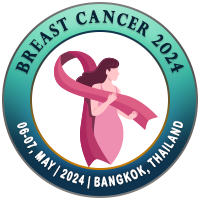
Dr. Xiyun Deng
Hunan Normal University School of Medicine, ChinaTitle: A neutrophil-related gene signature predicts immune status and sensitivity to nuclear receptor-targeting agents in triple-negative breast cancer patients
Abstract
Purpose: To develop a
neutrophil-related gene signature that can be used to predict survival outcomes
and direct individualized therapy of triple-negative breast cancer (TNBC)
patients.
Study Design: iTRAQ-based
proteomics analysis of breast cancer tissues and bioinformatics analysis of
TCGA-BRCA dataset were performed to evaluate the pathways enriched in TNBC. Immunohistochemistry
was used to determine neutrophil infiltration in TNBC vs. non-TNBC tissues.
Univariate and multivariate Cox analyses were performed on TCGA-TNBC dataset to
derive a neutrophil-related gene signature (NRGS) and develop a risk score to
stratify TNBC patients into high- and low-risk groups. A nomogram model was
generated by incorporating the NRGS with clinicopathological parameters to
predict survival outcomes of TNBC patients. The NRGS was analyzed for tumor
immune microenvironment and response to immune checkpoint inhibitors as well as
sensitivity to therapeutic drugs. A Gene Expression Omnibus (GEO) dataset
(GSE58812) was used for independent validation.
Results: iTRAQ-based proteomics
profiling of breast cancer tissue samples and bioinformatics analysis of TCGA-BRCA
dataset revealed neutrophil-related pathways as the top enriched pathways in
TNBC. A higher level of neutrophil infiltration was demonstrated by
immunohistochemistry on TNBC compared with non-TNBC tissues. A 9-gene NRGS was
identified and used to derive a risk score to stratify TNBC patients into high-
and low-risk groups. A nomogram model with superior predicting power was
generated via incorporating the NRGS with clinical tumor stage and pathological
nodal status. Furthermore, high-risk TNBC patients were associated with immune suppression,
expressed lower levels of immune checkpoints, and exhibited lower sensitivity
to CTLA4 and PD1/PDL1 blockers. Through screening classic and non-classic
therapeutic agents, we found that high-risk TNBC patients had enhanced
sensitivity to nuclear receptor-targeting agents such as SR8278 and VAF-347.
Conclusions: A neutrophil-related
gene signature and its derived nomogram model could predict immune status and sensitivity
to nuclear receptor-targeting agents in TNBC patients.
Biography
Xiyun Deng is a professor of
Pathophysiology, chair of Department of Basic Medical Sciences, and director of
Key Laboratory of Translational Cancer Stem Cell Research at Hunan Normal University.
His research focuses on experimental therapeutics targeting cancer stem cells
and the tumor microenvironment. In recent years, triple-negative breast cancer
(TNBC) has been a focus of intense investigations for his lab. With continued
funding support by grants from the National Science Foundation of China and
other sources, his team has found that: 1) post-translational modifications of
non-histone proteins play a crucial role in EMT/metastasis, metabolic reprogramming
and drug-induced cellular stress responses in cancer stem cells; and 2) dysregulated
immune microenvironment provides novel therapeutic targets for cancer. Dr. Deng
has published over 100 articles/reviews in high-impact professional journals
such as Blood, Clinical Cancer Research, Cancer Treatment Reviews, ACS Applied
Materials & Interfaces, International Journal of Cancer, Biomaterials
Science, etc. He is currently guest-editing a Research Topic for Frontiers in
Oncology regarding heterogeneity, tumor microenvironment and targeted therapy
in triple-negative breast cancer. As a principal editor, he has compiled a book
titled “Triple-Negative Breast Cancer”, which was published by World Scientific
Publishing (Singapore).

